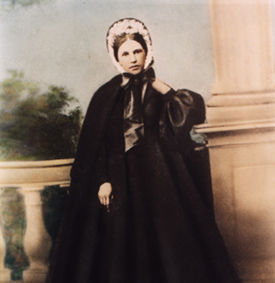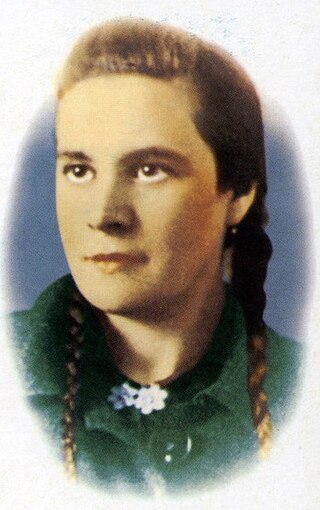
Maria Franciszka Siedliska, also known by her religious name Maria of Jesus the Good Shepherd, was a Polish Roman Catholic professed religious and the founder of the Sisters of the Holy Family of Nazareth. In childhood Siedliska was indifferent to her faith but after a local priest had converted her she became aware of a call to the religious life which her parents opposed. However the death of her father in 1870 enabled her to pursue her vocation. In 1873 she decided to found a religious congregation that received the blessing of Pope Pius IX before being established during Advent in 1875. Siedliska expanded her congregation from Rome to her native Poland and elsewhere, including Great Britain, France and the USA where she visited during her extensive travels.

María Romero Meneses, FMA was a Nicaraguan Catholic religious sister and a professed member from the Salesian Sisters of Don Bosco dubbed the "Social Apostle of Costa Rica".

Giulia Salzano was an Italian Roman Catholic professed religious and the founder of the Catechetical Sisters of the Sacred Heart of Jesus (1905). Salzano served as a teacher prior to becoming a religious and since 1865 worked in Casoria as a teacher for children where she demonstrated herself as an apt catechist and instructor.

Bolesława Maria Lament was a Polish religious sister and the founder of the Missionary Sisters of the Holy Family. Lament worked as a seamstress and soon joined a religious congregation though left just prior to her profession upon experiencing vocational doubts; she returned to her life as a seamstress and worked with two of her sisters to support their siblings and widowed mother. The death of her seminarian brother prompted her to return to the religious life – Honorat Koźmiński encouraged this return – and she later founded a congregation that soon spread and took her to Russia though its revolution forced her departure during World War I. Pope John Paul II beatified Lament while in Poland in 1991.

Maria Jabłońska - in religious Bernardyna - was a Polish Roman Catholic professed religious and the co-founder of the Sisters Servants of the Poor (1891) that she founded alongside Albert Chmielowski.
Giuseppina Gabriela Bonino, also known by her religious name Giuseppina Gabriella of Jesus, was an Italian Roman Catholic professed religious and the founder of the Suore della Sacra Famiglia di Savigliano. Bonino dedicated her life to the ill and to orphans and did this in drawing upon her own experience in tending to her ailing father and to orphans in her hometown - all this prior to and after the establishment of her religious congregation.

Maria Domenica Mantovani was an Italian Roman Catholic professed religious, and the co-founder of the Little Sisters of the Holy Family; she established them alongside Giuseppe Nascimbeni. As a nun she received the religious name of Maria of the Immaculate.

Assunta Marchetti was an Italian Roman Catholic religious sister and the co-founder of the Missionary Sisters of Saint Charles Borromeo Scalabrinians; she worked in Brazil from 1895 until her death. She has been beatified as a Blessed Mother. Her priest brother Giuseppe is titled as Venerable on the path to sainthood.
Teresa Manganiello was an Italian who became a member of the Secular Franciscan Order. She desired to establish a new religious congregation but died before the idea could come to fruition.

Maria Karłowska – in religious Maria of Jesus Crucified – was a Polish Roman Catholic professed religious and the founder of the Sisters of the Divine Shepherd of Divine Providence. Karłowska worked with poor and abandoned people with an emphasis on girls and also tried to aid prostitutes avoid such a life and build another kind of life so used her order to reach out to such people to render assistance.

Ludwika Szczęsna, SSCJ was a Polish Catholic religious sister. She was the co-founder of the Sisters, Servants of the Most Sacred Heart of Jesus which she established with Józef Sebastian Pelczar.

Maddalena Caterina Morano was an Italian Roman Catholic professed religious who was a member of the Salesian Sisters. Morano served as an educator for her entire life believing it to be her vocation; she served as a catechist in addition to being an educator.

Gertrude Prosperi was an Italian Benedictine. Prosperi assumed the religious name Maria Luisa Angelica and finally served as the abbess of her convent for an extended period of time until her death.

Anna Maria Adorni Botti, born Anna Maria Adorni, was an Italian religious sister of the Handmaids of the Immaculata, a congregation she established in 1857. Botti's vocation was to the religious life and as a child believed she was destined for the missions and later as a Franciscan religious sister. After being widowed she did pastoral work in Parma where she established and ran the congregation of the Handmaids of the Immaculata until her death.

María del Tránsito Cabanillas was an Argentine Roman Catholic Franciscan tertiary and the founder of the Franciscan Tertiary Missionary Sisters. Upon her solemn profession she assumed the religious name María del Tránsito de Jesús Sacramentado. Cabanillas was beatified on 14 April 2002.

Juana María Condesa Lluch was a Spanish religious sister who established the Handmaids of Mary Immaculate in her hometown of Valencia. She made her vows in 1911.

Mercè Prat i Prat, STJ was a Spanish Catholic nun who was a member of the Societatis Sanctae Teresiae a Iesu. She assumed the religious name of Maria Mercè of the Sacred Heart. She was killed during the Spanish Civil War on the charge of being a religious sister. Pope John Paul II beatified her on 29 April 1990 in Saint Peter's Square.

Enrichetta Alfieri, born Maria Angela Domenica Alfieri, was an Italian Roman Catholic religious sister and a member of the Sisters of Divine Charity.

Teresa Bracco was an Italian Catholic from Savona killed during World War II after refusing to submit to the sexual aggression of a Nazi soldier. Bracco was born to modest farmers and tilled in the fields while also attending Masses on a frequent basis.
Elvira Moragas Cantarero, religious name María Sagrario de San Luis Gonzaga, was a Spanish nun of the Order of the Discalced Carmelites of the Blessed Virgin Mary of Mount Carmel.

















